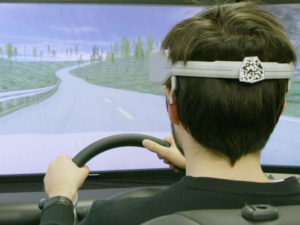Nissan extends car control to the human brain
Nissan‘s latest research focuses on using brain power to control vehicles and enhance reaction time, safety and more.

Nissan Brain-to-Vehicle technology aims to redefine driving
The new technology, called Brain-to-Vehicle, or B2V, works by measuring brain wave activity via a driver-worn device, which is then analysed by autonomous systems.
By anticipating intended movement, the systems can take actions – such as turning the steering wheel or slowing the car – 0.2 to 0.5 seconds faster than the driver, while remaining largely imperceptible.
“When most people think about autonomous driving, they have a very impersonal vision of the future, where humans relinquish control to the machines. Yet B2V technology does the opposite, by using signals from their own brain to make the drive even more exciting and enjoyable,” said Nissan Executive Vice President Daniele Schillaci. “Through Nissan Intelligent Mobility, we are moving people to a better world by delivering more autonomy, more electrification and more connectivity.”
Using signals from the driver’s brain, the Nissan vehicle is able to:
Predict: By catching signs that the driver’s brain is about to initiate a movement – such as turning the steering wheel or pushing the accelerator pedal – driver assist technologies can begin the action more quickly.
Detect: By detecting and evaluating driver discomfort, artificial intelligence can change the driving configuration or driving style when in autonomous mode.
Nissan will demonstrate capabilities of this exclusive technology at the CES 2018 trade show in Las Vegas.















